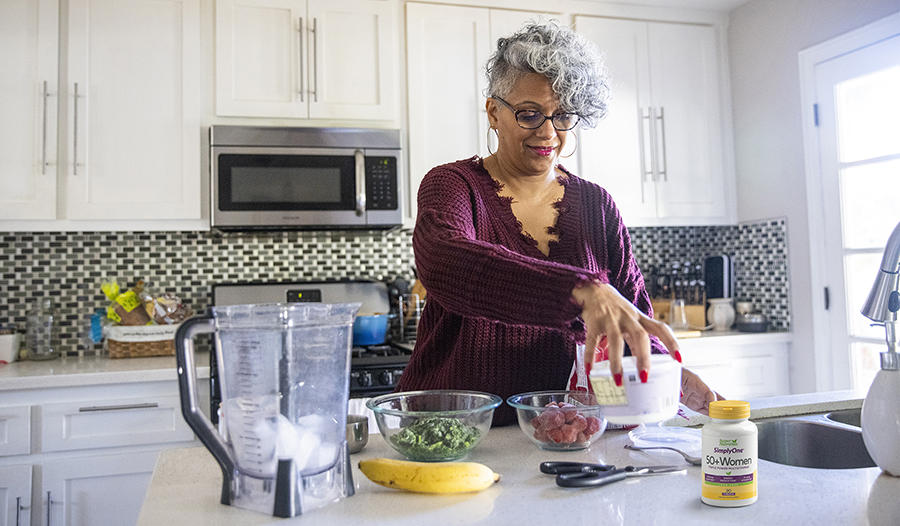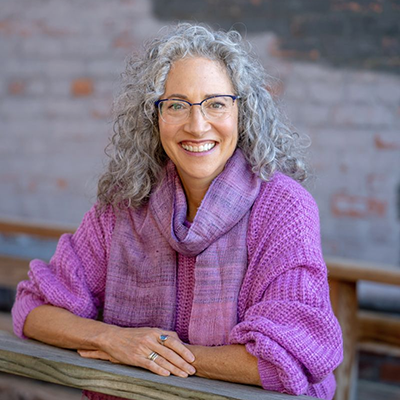How to Eat Right to Age Well and Feel Amazing as a Woman Over 50
DISCLAIMER:This blog does not intend to provide diagnosis...
- In this article:
- What Bodily Changes Happen to Women Over 50?
- The Nutrition Dilemma
- What’s the Best Diet for Women Over 50?
- Get Enough Protein
- Eating for Strong Bones
- Supplementation to Cover Your Nutrition Bases and Provide Additional Support
- Takeaway

Until relatively recently most women didn’t live past their 50s. You made it through menopause, reached an empty nest, and never got to enjoy your golden years.
Thanks to modern medicine and better living conditions, the average life expectancy for women in the United States is 80.5 years.1 This means that after 50 you’ve got decades of living to do.
How can you live your best life, feel fabulous, and age gracefully? Make smart lifestyle choices. Along with exercising regularly, quitting smoking if you’re a smoker, managing stress, and avoiding alcohol or drinking in moderation, eat right.
Switching up your diet after 50 can make a huge difference in how you feel, look, and age.
What Bodily Changes Happen to Women Over 50?
Your body is made of trillions of cells all working together to keep you alive. However, all these cells start to change as we age. They become larger and lose some of their ability to divide, function normally, and multiply. Repairing DNA also declines, which increases the risk of disease.
Since tissues and organs are made from cells, changes occur throughout your body. Everything transforms including skin, bones, muscles, joints, and organs. Your nervous, immune, reproductive, endocrine, digestive, musculoskeletal, and cardiovascular systems are all impacted by aging.
How you age is influenced by genetics, lifestyle, and environment. While aging is an inevitable process, a healthy, nutrient-rich diet can delay or slow aging. In contrast, a diet that’s high in calories, processed foods, and saturated fats can accelerate the aging process.
Wondering what part of the body ages fastest? While you may think it’s your skin, it’s your breasts. According to a study published in Genome Biology, breast tissue is the part of the body that’s most impacted by aging.
The decrease in estrogen associated with menopause causes gland tissue to shrink, reducing breast size. Connective tissue that supports breasts also slackens and, as a result, breasts start to sag. The skin on your decolletage, the area on your neck and chest, can also age when exposed to the sun, which is why it’s so important to protect it with a broad-spectrum sunscreen.
The Nutrition Dilemma
After 50 we’re faced with a nutrition dilemma: We need more of certain nutrients—including protein, calcium, certain B vitamins, and vitamin D—but fewer calories. This makes it more important than ever to eat a diet that is nutrient-dense.
According to the Institute of Medicine, a moderately active woman needs about 2,000 calories between 31 and 50, and only 1,800 after 51. There are several reasons why we need about 200 fewer calories a day after age 50 to maintain our weight.
First, unlike fat, muscle is metabolically active, using 7 to 10 calories per pound. This means that the more muscle mass you have the more calories you burn at rest, during activities, and while sleeping.
However, starting in our thirties we lose 3 to 8% of our muscle mass every decade. We also tend to move less as we age. According to the Centers for Disease Control, nearly 30% of women over 50 do not engage in regular physical activity.
Why do we need more nutrients? Our stomachs produce less acid as we age. This reduces the absorption of several key micronutrients, including vitamin B12, calcium, iron, and magnesium.
In addition, as women get closer to menopause—the time when you haven’t had a period in 12 consecutive months—estrogen levels decline. This can negatively impact bone density and muscle mass, which ups the requirement for protein, calcium, and vitamin D.
What’s the Best Diet for Women Over 50?
The best diet to pack your plate with nutrients, stay healthy, and reduce inflammation is a whole foods plant-based (WFPB) diet. Conversely, a poor diet that’s high in sugar, refined carbohydrates, and fast and fried foods can accelerate aging.
Reams of research show that plant-based diets—such as DASH and the Mediterranean diet—may lower your risk of chronic disease. Eating the rainbow (i.e. a variety of colored plant foods) also provides an array of phytochemicals that may have anti-aging properties.
Polyphenols
Foods containing polyphenols, a type of compound that’s packed with antioxidants, can help prevent inflammation. Good sources include onions, berries, leafy greens, red grapes, and green tea.
Plant-Based Helps Prevent Menopausal Weight Gain
Eating the WFPB way can also help reduce your cholesterol levels and prevent menopausal weight gain. That’s because these diets are rich in produce and so tend to be lower in calories than the Standard American Diet (SAD). Plant foods also contain water and fiber, so they fill you up without filling you out. You feel content while consuming fewer calories, so you eat less.
Nuts and Seeds
The major exception is nuts and seeds. While rich in healthy fats that can support healthy aging, nuts and seeds are high in calories. Enjoy them in moderation by keeping portions to a small handful—about an ounce and a half.
Soluble Fiber
The abundance of soluble fiber found in plant foods can also lower your “bad” LDL cholesterol level and improve the absorption of nutrients. Soluble fiber reduces the amount of cholesterol that gets into your bloodstream.
At the same time, it dissolves in your gut and slows down digestion. This gives healthy bacteria living in your digestive tract an opportunity to extract nutrients that can then be absorbed by the body.
Good sources of soluble fiber include beans, oatmeal, apples, pears, and brussels sprouts.
Soy Foods May Help Reduce Hot Flashes
In addition, eating a plant-based diet that’s rich in soy foods can help reduce the number of hot flashes and night sweats you experience as you go through menopause.
A 12-week study published in the journal Menopause found that postmenopausal women who ate a low-fat vegan diet that included half a cup of cooked soybeans daily experienced a reduction in moderate-to-severe hot flashes from nearly five a day to less than one a day.2 During the study almost 60% of participants stopped experiencing moderate-to-severe hot flashes. Many subjects also said that sexual symptoms, overall energy, and mood improved.
Meat in Moderation
Eating a whole foods plant-based diet doesn’t mean becoming a vegan and eliminating meat, poultry, fish, eggs, and dairy. You can still eat foods of animal origin, just decrease the amount.
Think of meat as a compliment, not the focal point of your meal. Look to ethnic cuisines that use small amounts of meat to flavor soups, stews, casseroles, and stir-fries. Perhaps go meatless one day or meal a week. Or substitute a category of animal products for a vegan source. For example, replace cow’s milk with soy milk, or beef with veggie burgers, or plant-based “ground round.”
Reducing your intake of animal products that are high in saturated fat, such as red meat and cheese, can also help to lower calories and your risk of heart disease.
Get Enough Protein
To help maintain muscle mass and muscle strength it’s important to eat enough protein.
After age 50 the daily protein recommendation increases from 0.8 grams to 1 to 1.2 grams per kilogram of body weight. This means that after 50 you need 0.45 to 0.55 grams of protein per pound, which equals 67 to 83 grams for a 150-pound woman.
Foods high in protein include legumes, meat, poultry, fish, eggs, and dairy. The best way to ensure that you get enough protein is to have a serving at every meal and snack.
For example, have an egg or glass of milk at breakfast or add a scoop of pea or soy protein to a morning smoothie. At lunch have a turkey sandwich or add tofu or canned salmon to a salad. For dinner have 3 to 4 ounces of chicken breast, a veggie burger, or bean burrito. High-protein snacks include edamame, fruit with nut butter, and low-fat yogurt.
In addition, to help preserve muscle mass and strength and increase your metabolism, make sure to strength train several times a week. You can use dumbbells or resistance bands or incorporate bodyweight exercises, such as push-ups and lunges, into your exercise routine. Regularly practicing yoga can also help you gain muscle and strength.
Eating for Strong Bones
There are several things you can do after 50 to prevent osteoporosis and ensure that your bones stay strong.
Calcium
First, make sure to consume enough calcium. Calcium requirements increase from 1,000 milligrams a day to 1,200 milligrams a day after 50. Good sources include low-fat dairy products, calcium-fortified beverages, edamame, tofu, canned sardines, or salmon (with bones).
Magnesium
After menopause, you may also need more magnesium to help prevent bone loss.3 The recommended daily allowance (RDA) for magnesium for adult women is 310 to 320 milligrams per day. This mineral is found in many foods, including almonds, peanuts, cashews, beans, soy foods, leafy greens, fortified cereals, dark chocolate, and whole grains.
Vitamin D
Consuming adequate amounts of vitamin D to support calcium absorption is also important. An increasing amount of research suggests that vitamin D deficiency may be associated with cardiovascular disease and other chronic disorders.
Sunlight is the natural source of vitamin D, but many women don’t get enough—especially individuals who live in the north. Studies have found that over 40 percent of American adults are deficient in vitamin D.4
The U.S. Institute of Medicine recommends an average daily intake of 400 to 800 International Units (IU), but some studies recommended higher levels of 1000 to 4000 IU, the safe upper limit. It’s a good idea to have your level of vitamin D measured so you can determine the right amount you need.
Foods high in vitamin D include tuna, sardines, salmon, and cod liver oil. Many foods are also fortified with vitamin D, including cereals, cow’s milk, soy milk, and orange juice. You can also take a vitamin D supplement to make sure you consume adequate amounts.
Collagen
Consider adding collagen to your diet. Not only can taking collagen help you to meet your protein needs, but research also shows it may improve bone mineral density in postmenopausal women.5, 6
Melatonin
Melatonin, a hormone naturally made by your body that promotes sleep, may also prevent postmenopausal bone loss. A meta-analysis of three randomized controlled trials concluded that melatonin may be used as a safe nutritional supplement to improve bone density in perimenopausal and postmenopausal women, though more research is needed to confirm its efficacy.
Supplementation to Cover Your Nutrition Bases and Provide Additional Support
While eating right is your first line of anti-aging defense, wise supplementation can ensure that you cover all your nutrition bases and support healthy aging.
Multivitamin
Start with a multivitamin-mineral complex specifically made for women over 50. If you’re no longer menstruating and therefore not losing iron from blood loss, look for a product that is low in or doesn’t contain iron.
Omega-3 Fatty Acids
The Dietary Guidelines for Americans recommend consuming at least 8 ounces of fish a week. If you don’t eat fish or don’t eat enough to meet that guideline, consider adding an omega-3 supplement to your regimen or consume oils high in omega-3 fatty acids, like flaxseed oil.
Studies have shown that healthy fats, including omega-3 fatty acids, may also decrease menopausal symptoms. Omega-3 fatty acids support brain and heart health and have been shown to decrease inflammation.
Supplements to Reduce Inflammation
While inflammation is a normal process that is important for healing, when it is chronic it can also injure tissues, joints, and blood vessels. This damage can cause arthritis, heart disease, and Alzheimer’s. You can determine whether you have chronic inflammation by taking a blood test that measures a liver chemical called, C-reactive protein.
Along with fish oils, several other supplements may help reduce inflammation:
- Curcumin: Studies have shown that curcumin, which is found in turmeric, may reduce C-reactive protein.
- Ginger: Studies suggest consuming ginger may help reduce C-reactive protein.
- Resveratrol: An antioxidant found in purple fruits such as grapes and blueberries, resveratrol has been shown to reduce inflammation when taken as a supplement.
- Spirulina: Research has also shown that spirulina, a type of blue-green algae, may reduce inflammation.
- Vitamin C: As a powerful antioxidant, vitamin C can help lower inflammation.
Before using a supplement to reduce inflammation and promote healthy aging, talk with your doctor or registered dietitian, especially if you are taking medications or have specific medical issues.
Takeaway
Make the most of your golden decades by eating right to preserve your health and age gracefully. By focusing on the most important nutrients for women over 50, you can preserve your bone density, reduce muscle loss, stave off post-menopausal weight gain, reduce inflammation, prevent chronic disease, and feel fabulous living your best life.
References:
- National Vital Statistics System. Provisional Life Expectancy Estimates for January through June, 2020. https://www.cdc.gov/nchs/data/vsrr/VSRR10-508.pdf
- Barnard, Neal D. MD, FACC1,2; Kahleova, Hana MD, PhD1; Holtz, Danielle N. BS1; del Aguila, Fabiola PhD1; Neola, Maggie BS, RD1; Crosby, Lelia M. BA, RD1; Holubkov, Richard PhD3 The Women's Study for the Alleviation of Vasomotor Symptoms (WAVS): a randomized, controlled trial of a plant-based diet and whole soybeans for postmenopausal women, Menopause: October 2021 - Volume 28 - Issue 10 - p 1150-1156 doi: 10.1097/GME.0000000000001812
- Castiglioni S, Cazzaniga A, Albisetti W, Maier JAM. Magnesium and Osteoporosis: Current State of Knowledge and Future Research Directions. Nutrients. 2013; 5(8):3022-3033. https://doi.org/10.3390/nu5083022
- Forrest KY, Stuhldreher WL. Prevalence and correlates of vitamin D deficiency in US adults. Nutr Res. 2011 Jan;31(1):48-54. doi: 10.1016/j.nutres.2010.12.001. PMID: 21310306.
- König D, Oesser S, Scharla S, Zdzieblik D, Gollhofer A. Specific Collagen Peptides Improve Bone Mineral Density and Bone Markers in Postmenopausal Women-A Randomized Controlled Study. Nutrients. 2018 Jan 16;10(1):97. doi: 10.3390/nu10010097. PMID: 29337906; PMCID: PMC5793325.
- Rizzoli R, Stevenson JC, Bauer JM, van Loon LJ, Walrand S, Kanis JA, Cooper C, Brandi ML, Diez-Perez A, Reginster JY; ESCEO Task Force. The role of dietary protein and vitamin D in maintaining musculoskeletal health in postmenopausal women: a consensus statement from the European Society for Clinical and Economic Aspects of Osteoporosis and Osteoarthritis (ESCEO). Maturitas. 2014 Sep;79(1):122-32. doi: 10.1016/j.maturitas.2014.07.005. Epub 2014 Jul 17. Erratum in: Maturitas. 2015 Mar;80(3):337. PMID: 25082206.

 By Dr. Ellen Albertson, PhD, RDN, NBC-HWC
By Dr. Ellen Albertson, PhD, RDN, NBC-HWC


